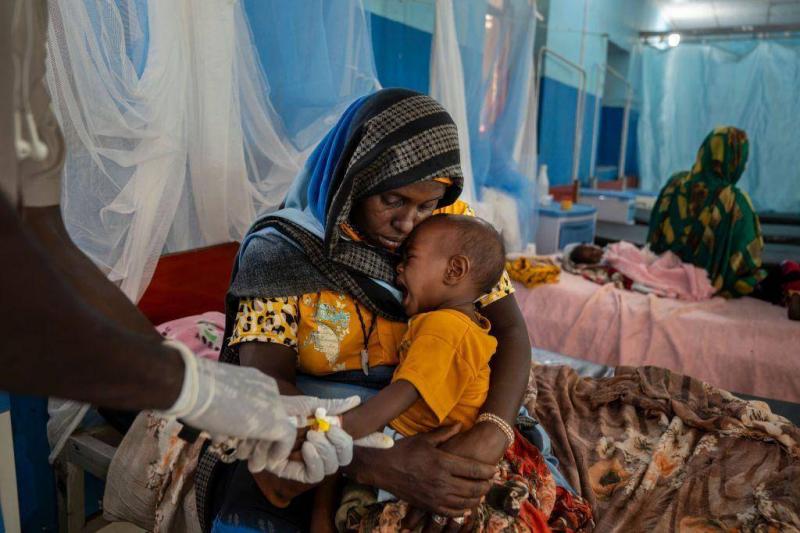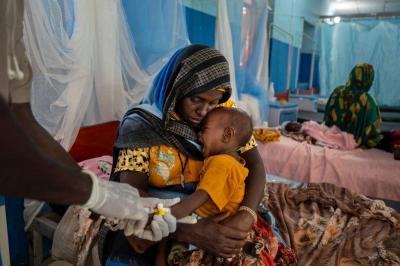Displaced people in the Kalma camp (Darfur) have no food or drink, and some resort to eating leftovers from garbage, while others consume corn husks (the remaining husks from corn crops), as described by Omar Sharifuddin, a resident of Kalma camp in Nyala, the capital of South Darfur. Sharifuddin's family consists of 12 members, who eat only one meal a day made of corn husks. He told BBC, "Even now, displaced children and elderly people die daily from malnutrition," urging humanitarian organizations to come to the camp "to save the displaced from hunger and death."
The General Coordination of Displaced and Refugees in Darfur reported to BBC News Arabic that some residents of Darfur have resorted to eating locusts due to food scarcity, resulting in high levels of hunger. The coordination sent a video showing piles of locusts displayed in a market in South Darfur for food. In the background of the video, a woman says, "Hungry children find no food other than locusts and have to eat them."
Awaatif Abd al-Rahman Yusuf, head of the Women’s Office for the displaced in the General Administration of Camps in Darfur, who lives in the Skeli camp for the displaced in South Darfur, confirmed that some residents eat locusts. She added, "Some people eat locusts, while others eat corn porridge (maize flour cooked with water). Those who eat bread comprise less than 20 percent."
The price of a pile of locusts has reached 1,000 Sudanese pounds. Residents of South Darfur do not rely solely on locusts; Muhammad Younis (a pseudonym), speaking to BBC from the Jebel Marra area in Central Darfur, said, "Most citizens here use locusts as their daily food," especially since it is the season for desert locusts.
According to Muhammad Younis, previously, the people of Darfur would eat locusts as part of their culture, but not as a main food meal. He continued, "Here, locusts are used as a substitute for meat and do not taste good; they taste like dried meat that has been stored for a long time."
"Most" residents of Jebel Marra rely on catching locusts using insecticides or by burning them instead of buying them. The price for a small pile of locusts (less than a kilogram) is 1,000 Sudanese pounds (approximately two dollars), which is considered extremely high for the residents, according to Adam Rijal from the displaced coordination.
Muhammad Younis has warned residents several times about the effects of eating locusts caught with insecticides, "but to no avail." Not only the residents catch locusts, but merchants do so as well, relying on them as a source of livelihood to display and sell for food.
Others in the Jebel Marra area have resorted to eating tree leaves due to hunger, while some residents consume the "gourd plant." Two weeks ago, the Sudan Liberation Movement, led by Abdel Wahed Nour, announced what it described as a "severe famine" hitting the areas under its control in Jebel Marra via an official statement on its website.
"The result will be death if food does not reach us," the general coordination of displaced and refugees in Darfur noted that it recorded 443 child deaths in the Kalma camp since the onset of the war in Sudan.
Awaatif Abd al-Rahman Yusuf indicated that "the conditions for the displaced in Beleel locality in South Darfur are extremely difficult, where 19 people have died due to hunger, in addition to many deaths among children." She added, "Since the outbreak of the war until now, no humanitarian aid has reached the state… the situation portends a major disaster, and death will be the inevitable result if food does not reach us."




